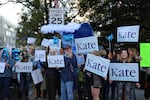Political junkies hoping to hear something new from the top two candidates for Oregon governor didn’t find much Tuesday night, as Democratic Gov. Kate Brown and Republican Rep. Knute Buehler met for their third and final debate.
In an hourlong affair that mixed questions from political journalists with videotaped questions from voters, Brown and Buehler touched on issues that have become a hallmark of the campaign including funding for education, homelessness and the state's uncertain budget.
Throughout it all, Buehler continued to question Brown’s leadership. And Brown again suggested Buehler was out of touch with regular Oregonians, accusing him of switching political stances.

Republican gubernatorial candidate Knute Buehler arrives for his third and final debate with Gov. Kate Brown.
Dirk VanderHart / OPB
But the debate, organized by KGW and The Oregonian/OregonLive, did manage to plumb some new territory.
Most notably, the candidates fielded a question about vaccinations, and whether Oregon parents should continue to have freedom as to when or if they vaccinate their children.
RELATED: Where They Stand: Oregon's Gubernatorial Candidates On Immigration
Brown suggested that approach raises the risk of spreading unnecessary communicable disease, saying, “We probably give parents a little too much leeway.”
Related: Number Of Parents Seeking Vaccine Exemptions In Oregon On The Rise
Buehler, a trained physician, said he agreed with Oregon’s rules.
“I believe in the benefits of vaccination,” he said, “but I also think that parents should have the ability to opt out.”
The candidates also addressed the issue of the death penalty in a debate for the first time. Oregon has not executed an inmate since former Gov. John Kitzhaber announced a moratorium on the practice in 2011.
Brown has continued that moratorium and said Tuesday she had no plan to change that approach.
“On my watch, no one will be executed,” she said.
Buehler repeated his pledge to resume executions, which he first voiced while running for the Republican nomination earlier this year.
RELATED: Where They Stand: Oregon Gubernatorial Candidates On Housing, Homelessness
“I will follow the desires of the voters of Oregon … and I will enforce the death penalty,” he said.
Related: Oregon Ballot Measure 106 Would Limit Access To Abortions
Tuesday also marked the first debate that addressed what has been a key point of contention in this year’s race: abortion. Buehler has steadfastly painted himself as pro-choice, touting legislation he pushed allowing women to access birth control over the counter and vowing to keep Oregon's abortion laws in place.
Brown and her allies have hammered away at the issue, suggesting Buehler presents himself as pro-choice only when it suits him politically. As she has repeatedly, Brown pointed to Buehler’s opposition to a 2017 bill that expanded abortion access to all Oregonians.
In one of the sharper exchanges of the night, Buehler hit back, saying: “Gov. Brown knows when people understand that I’m pro-choice, moderate and an independent-minded Republican, she is quite likely to lose this election.”
But Brown pressed her point. “Rep. Buehler tells some voters one thing and other voters another,” she said. “Unfortunately that game won’t work tonight because the whole state is watching.”

Supporters of Gov. Kate Brown demonstrate in Portland outside of the third and final gubernatorial debate of the 2018 campaign.
Dirk VanderHart / OPB
The most substantive discussions of the night occurred on the subjects of the state’s looming pension crisis and climate change.
Oregon’s public employee retirement system, known has PERS, faces a funding shortfall of $22 billion, and Brown and Buehler have clashed over how to address it.
Buehler has said he’d switch public employees over to a 401(k)-style system similar to what most private-sector employees have. And he’s said Oregon must make public employees pay into the PERS system — a move that Brown and her allies in public employee unions say would drastically cut worker retirements.
“I think it’s easy for a millionaire to say he’s going to cut the retirements of hardworking Oregonians,” Brown said, referencing Buehler’s wealth as a doctor and businessman. “I’m not willing to do that.”
Still, Brown conceded that public employees could “do more” to help with the issue.
Buehler said Brown’s attempts to fix the issue have been “political theater,” saying concessions she’s won from employees on pension matters have been paid back with pay raises.
“That’s not leadership, that’s pandering,” he said.
On climate change, Brown and Buehler were asked how they’d lead in making Oregon a center for green energy. The issue could be meaningful in coming months because Oregon lawmakers appear ready to seriously consider bills in next year’s legislative session that would cap carbon emissions. Brown supports the policy. Buehler has said he believes climate change is a threat, but that such an idea would be too costly.
Related: Time Is Running Out To Control Climate Change, U.N. Report Says
“Probably a better way to describe it is a $1.4 billion sales tax on energy,” Buehler said when pressed on the topic by one of the moderators.
The event marked the candidates’ third debate in a week, and likely the last time Oregon voters will see the two candidates on stage together before the Nov. 6 election.
According to most indicators, the race is tight with a little more than a week until ballots start going out to voters. A new poll commissioned by The Oregonian/OregonLive and KGW suggested Brown had a 4-point lead on Buehler, but that lead was within the poll’s 5.2-point margin of error. Other recent polls have found similar results.
For the second debate in a row, Independent Party candidate Patrick Starnes was not allowed to participate because polls suggest he couldn’t meet a threshold of 10 percent support set by organizers. That decision spurred a small protest outside, with around a dozen Starnes supporters outside of KGW studios waving signs that read “Let Patrick Starnes speak” and “Let Patrick Starnes be heard.”
